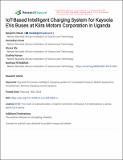| dc.description.abstract | The increasing popularity of Electric Vehicles (EVs) has led
to a surge in the need for charging stations in Kayoola EV
buses. Most of existing EV charging stations have outdated
features which is challenging to be remotely controlled.
However, current EV charging systems experience with no
remote battery operational charging status, unsafety
control if charging station is faulted, and insecure charging
RFID card payment. This paper, an IoT-based system was
aimed to manage and monitor these EV charging stations.
The battery management system (BMS) sends charging
voltage and current information to charger via Controller
Area Network (CAN) bus. Then, the Raspberry Pi4 receives
and decode CAN charging data to be processed, analyzed
and transmits to the cloud server. Each charger is equipped
with sensors monitoring parameters like charging status,
energy consumption, voltage, current, and time. The user
can access that decoded charging information via android
mobile application and desk remote management system.
Additionally, the system server calculates the battery
charging levels and commend RFID card transaction
payment. The results show that developed IoT-based
intelligent charging system provides and outperforms
minimum and maximum cell voltages of 2.82V and 4.1V,
min. and max. cell temperatures of 37℃ and 40℃
respectively. The charged energy of 10kWh, used energy of
0kWh, charging state indication, low-cell voltage as error
state indication, charging price rate of 500Ugx/kWh, and
full-latch of 0, pack voltage of 483.9V, pack current of
100.1A, battery health of 97%, battery state of charge (SoC)
of 100% and remaining charging time of 38 mins were also
detected and remotely monitored. In conclusion, the
developed system proves 100% of real-time and remote
data access and accuracy, efficiency, security,
accessibility, sustainability, safety charging payment, and
remote battery status monitoring system of EV charging
infrastructure compared to the current charging where it
offers only 58.75% of charging rate. | en_US |

